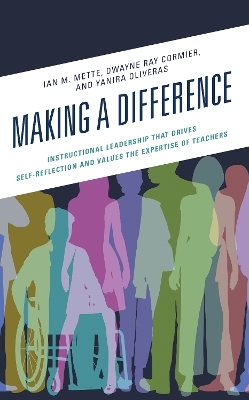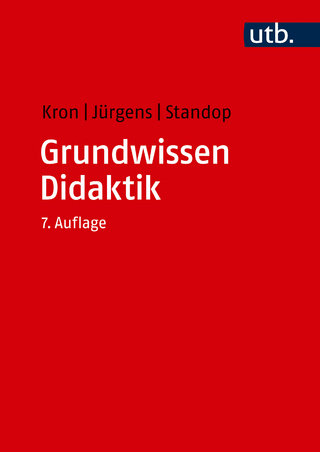
Making a Difference
Rowman & Littlefield (Verlag)
978-1-4758-7225-5 (ISBN)
This book aims to equip educators with a framework for providing instructional leadership that ensures culturally responsive instruction. Changing what is taught, how it is taught, and who it is intended for is one of the most effective ways of contributing to a more progressive, equitable, and inclusive society. This requires instructional leaders to become equity leaders who mitigate harmful educational practices from prepackaged curricula and teacher evaluation systems. Through an intentionally diverse team of educators, schools can observe, measure, and support teachers to become culturally responsive instructors through formative feedback structures. It is through the practice of culturally responsive instructional supervision that schools can transform from systems of oppression into systems of opportunity.
Ian M. Mette is an Associate Professor of Educational Leadership where he focuses his interests on the development of culturally responsive instructional supervision and developing equity-minded school leaders in predominantly White rural spaces. Specifically, his work targets closing the gap between theory and practice to inform and support equitable school improvement efforts for all students Dwayne Ray Cormier is an Assistant Professor and entrepreneur specializing in instructional supervision and asset-based pedagogies. His research focuses on developing unplugged and plugged andrological, pedagogical, and supervision tools that assess and codify educators' sociocultural gaps and examine their impact on cultural competence, teacher-student relationships, educational opportunity gaps, and school culture. Yanira Oliveras-Ortiz is an Associate Professor of Curriculum & Instruction with a specialization on instructional supervision and school improvement. She had led the national implementation of instructional supervision in Belize. Through her work in Belize, she has engaged teacher preparation programs in the development of action plans to move from evaluation to instructional supervision, and from teacher-centered to student-centered instruction.
Contents
Prologue
Preface
Acknowledgments
IntroductionThe Instructional Leader as an Equity Leader
To whom and what are we most accountable?
Why leadership is crucial to the conversation
Why we need culturally responsive instructional supervision now
How developing empathy can make our communities better
Learning to stand up to hatred
Part IAddressing the Feedback Loop Problem in US Schools
Chapter 2Shifting Feedback from Hierarchical to Helpful
Shifting away from plantation practices
Reexamining the purpose of feedback about instruction
Utilizing ongoing conversations to cocreate knowledge and promote authentic accountability
Leveraging relational trust to promote more inclusive instruction
Chapter 3Liberating Ourselves from Prepackaged Systems
Why moving beyond the checklist is so important
How templates prevent critical thinking
Learning to create feedback practices that are immediately useful
Developing common language and assumptions about learning
Meeting policy requirements through pedagogies that lead to equitable outcomes
Chapter 4Learning to Engage in a Community of Culturally Responsive Instructors (CCRI)
Considering the role of data in acts of educational resistance
Why autonomy is at the heart of inclusive instruction
How critical colleagues can collaborate for co-liberation
Sharing learning as a form of love across a school culture
Questioning power structures to address systemic inequity
The challenges of moving forward with the work
Part IIDeveloping a Team of Inclusive Instructional Leaders
Chapter 5Being Intentional about Representation
Why representation matters
Shifting away from racial and sexual contracts
Other sociocultural identities to consider
Determining how ‘instructional success’ is measured
The goal is not to maintain comfortableness
Being clear about steps for success
Chapter 6Working Together to Determine What Culturally Responsive Instructional Supervision Looks Like
Determining goals for walkthroughs
What does equity data look like in a walkthrough?
How ongoing instructional reflections inform practice
The process of examining walkthrough data
Using data to drive professional development efforts
Chapter 7Establishing A Plan of Action When Instruction is Not Inclusive
Defining what teaching looks like that lacks cultural responsiveness
Determining feedback and support structures to addresses problematic pedagogies
Further developing reflective and inclusive instruction
Seeing criticality as a tool for emancipation
Developing the scaffolding for transformation
Part III Supporting Ongoing Growth and Development of Culturally Responsive Instruction
Chapter 8Growth Starts with the Self
Using agency to address the purpose of education
Owning content expertise
Learning to address the needs of society over our own comfort
Knowing pedagogical look-fors when reflecting on teaching
Chapter 9Learning to Grow with Critical Colleagues
How critical colleagues help to better understand the self and others
Topics of discussion for critical colleague groups
Being purposeful with discussions to drive difficult growth edges
Using every group conversation as an opportunity to discuss equity
Chapter 10Using Peer-Led Classroom Observations to Drive Equitable Outcomes
How peer walkthroughs can help calibrate building-wide expectations
Using peer feedback to inform inquiry cycles
Transforming feedback to deconstruct systems of inequity
Allowing instructional improvement efforts to evolved over time for more equitable outcomes
ConclusionSignaling a Shift in Where We Must Go
Resisting technorational approaches to improving instruction
Using supervision to support a system of opportunity
Honoring ‘getting into good trouble’
A closing note to practitioner
| Erscheinungsdatum | 07.09.2023 |
|---|---|
| Verlagsort | Lanham, MD |
| Sprache | englisch |
| Maße | 159 x 242 mm |
| Gewicht | 390 g |
| Themenwelt | Sozialwissenschaften ► Pädagogik ► Didaktik |
| ISBN-10 | 1-4758-7225-9 / 1475872259 |
| ISBN-13 | 978-1-4758-7225-5 / 9781475872255 |
| Zustand | Neuware |
| Haben Sie eine Frage zum Produkt? |
aus dem Bereich


